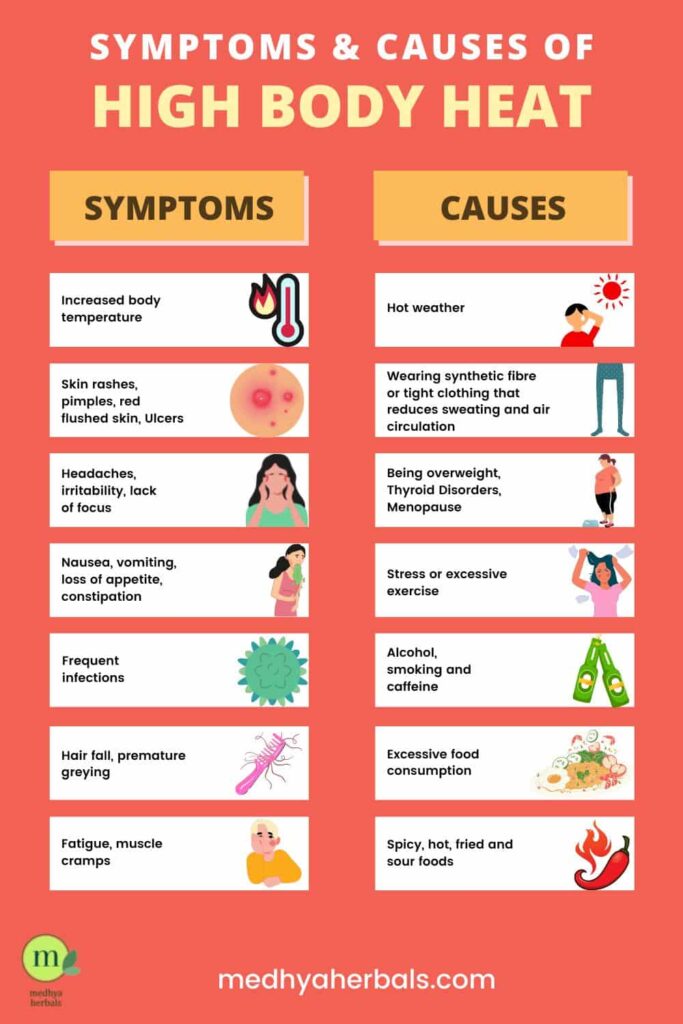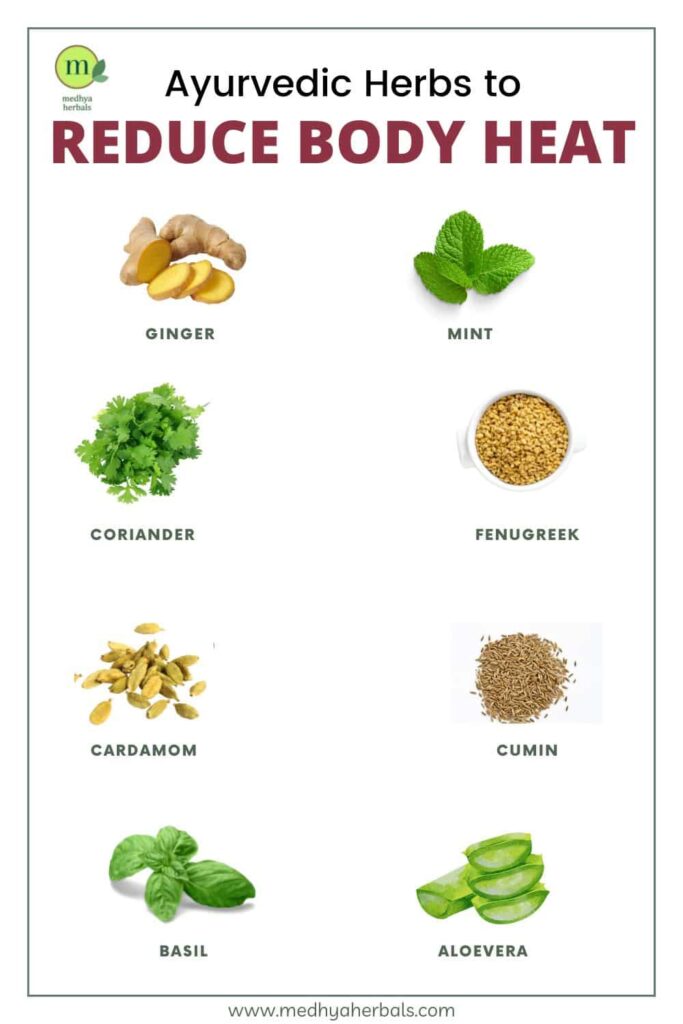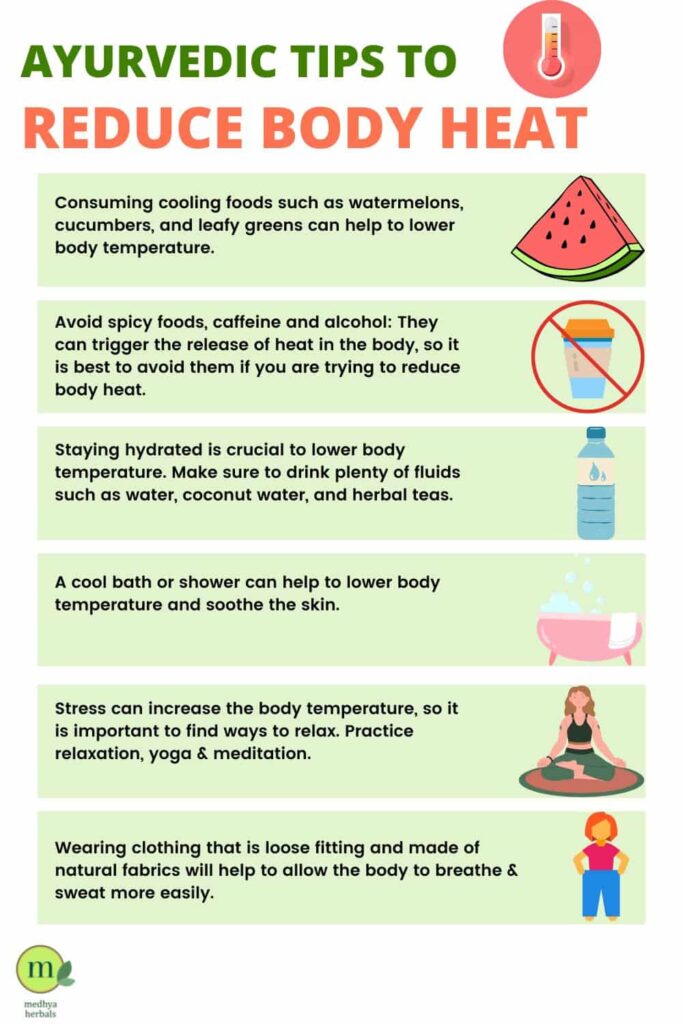Insomnia, irritability, burning sensations, inflammation, rashes, migraines and heavy menstrual bleeding are all indications of “heat stress” in our body. While there are natural mechanisms in place inside our body to maintain our temperature, sometimes the body systems are not able to function well. Factors such as high outside temperatures, faulty diet and lifestyle choices and certain life stages as menopause and pregnancy in women can make things worse.
And if proper measures are not taken to reduce the body heat fast, one may end up suffering from painful symptoms of high heat inside the body.
If you’re looking for ways to reduce body heat, Ayurveda has a lot to offer. There are a number of simple and effective Ayurvedic remedies that can help relieve the symptoms of body heat, including hair fall, pimples, and skin rashes.
In this post, you will learn about the causes and symptoms of high body heat and the best Ayurvedic ways to reduce body heat fast.

What causes too much heat in the body?
According to Ayurveda, high heat in the body is a sign of pitta dosha imbalance. Pitta controls the fire element in the body, and when it is out of balance, it can lead to a build-up of heat, inflammation or infection, higher body temperature, symptoms related to hormonal imbalances.
Pitta imbalance can happen because of both internal and external influences. Here are possible reasons for pitta dosha aggravation:
1. Hot weather: When the weather is hot, your body has to work harder to cool itself down. This can lead to increased internal body heat.
2. Exercising: Exercise can increase your internal body temperature. This is why it’s important to drink plenty of fluids when you’re working out.
3. Wearing heavy clothing or synthetic fabrics: Heavy clothing and synthetic fibre can trap heat against your skin and cause your internal body temperature to rise.
4. Being overweight: If you’re overweight, you have more tissue that needs to be cooled by your body. This can lead to increased internal body heat.
5. Certain medical conditions: Some medical conditions, such as overactive thyroid gland and fever can cause high internal body heat. Additionally, some medications can also increase body temperature.
6. Menopause: Menopause can cause hot flashes, which are sudden surges of heat that can cause your internal body temperature to rise.
7. Psychological stress: Psychological stress can cause your body to release hormones that can lead to increased internal body heat.
8. Inability to sweat: Sweating is our body’s natural mechanism to cool itself down. When one is not able to sweat due to drying and cooling surroundings such as air conditioned rooms, then also one may experience internal heat built up in the body.
9. Microbial Infections: Some infections like Typhoid, Tuberculosis etc. can also lead to increased body temperature as they are associated with fever. Certain viral infections like Dengue and Chickenpox can also cause high internal body heat.
10. Alcohol consumption: Alcohol consumption can lead to dehydration, which can cause your internal body temperature to rise.
11. Cigarette smoking: Cigarette smoking can also lead to dehydration, which can cause your internal body temperature to rise.
12. Caffeine consumption: Caffeine can act as a stimulant and increase your internal body temperature.
13. Too much food: Eating too much food can also lead to increased internal body heat. This is because your body has to work harder to digest the food.
14. Spicy foods: Eating spicy foods can also lead to increased internal body heat. This is because the spices can trigger a release of hormones that can cause your body temperature to rise.
15. Staying hungry for long: Excessive fasting and staying hungry for long periods of time causes your body to break down muscle tissue and stored fat for energy. This process can generate heat and cause high body heat symptoms.

Symptoms of High Internal Body Heat
High internal body temperatures can make you irritable, distract you from your tasks, and cause sleeplessness. Heat cramps, heat exhaustion, heatstroke, and hyperthermia are all possible in severe situations.
Here are the symptoms of high internal body heat that you need to know:
High Body Temperature and Skin Rashes
1. Increased body temperature: This is the most common and obvious symptom of high internal body heat. Your body temperature may be elevated even if you don’t feel hot to the touch.
2. Red, flushed skin: If your skin is red and flushed, it’s a sign that your internal body temperature is high. In addition, you may also experience burning sensation in large parts of your body.
3. Sweating: Sweating is your body’s way of cooling itself down, so if you’re sweating more than usual, it could be a sign of high internal body heat.
4. Skin rashes and pimples: Skin rashes and pimples can be a symptom of high internal body heat. This is because the heat can trigger inflammation in the skin.
Headaches and Irritability
5. Dizziness or lightheadedness: These are common symptoms of heat exhaustion, which can occur when your internal body temperature gets too high.
6. Migraine headache: A headache can be a symptom of high internal body heat, as well as dehydration from sweating too much.
7. Irritability: Feeling short-tempered and easily agitated is a common symptom of high internal body heat. When your body temperature is elevated, it can affect your mood.
8. Difficulty concentrating: It can be hard to focus when your internal body temperature is high. This is because the heat can make you feel uncomfortable and distracted.
Digestive Symptoms
9. Nausea or vomiting: Nausea and vomiting can be caused by many things, but they can also be symptoms of heatstroke, which is a medical emergency caused by extremely high internal body temperature.
10. Ulcers: stomach ulcers can be a symptom of high internal body heat. This is because the heat can irritate the lining of the stomach, leading to inflammation and ulceration.
11. A loss of appetite: Not feeling hungry can be a symptom of high internal body heat. When your body temperature is elevated, it can affect your appetite.
12. Constipation: High internal body heat can lead to constipation because it can slow down digestion.
Other Unpleasant Symptoms
13. Rapid heartbeat: A rapid heartbeat is another common symptom of heat exhaustion or heatstroke.
14. Muscle cramps: Muscle cramps can be caused by many things, but they’re also a common symptom of dehydration, which can happen when you sweat too much and lose fluids.
15. Fatigue: Feeling tired and sluggish is another common symptom of high internal body heat. If you can’t seem to muster up the energy to do your usual activities, it could be a sign that your internal temperature is too high.
16. Hair fall and premature greying: excess heat in the body can cause hair fall and premature greying.
17. Changes in urine output: You may urinate more frequently if you have high internal body heat. This is because your body is trying to flush out the excess heat.
18. Frequent infections: High internal body heat can make you more susceptible to infections. This is because the heat can weaken your immune system.
If you’re experiencing any of these symptoms, it’s important to drink plenty of fluids and seek medical attention if your symptoms are severe. Heat exhaustion and heatstroke are both serious medical conditions that require prompt treatment.
Ayurvedic Natural Remedies to Reduce Body Heat
There are a number of Ayurvedic herbal remedies that can be used to reduce heat in the body. Some of these herbs include:

1. Aloe vera: Aloe vera is a cooling herb that has been used for centuries to treat a variety of skin conditions. It can also be helpful in reducing body heat.
2. Mint: Mint is another cooling herb that can be used to relieve heat-related symptoms such as headaches and nausea.
3. Fenugreek: Fenugreek is an herb that has been shown to help lower body temperature.
4. Turmeric: Turmeric is a spice that contains a compound called curcumin, which has anti-inflammatory and antioxidant properties. Additionally, turmeric can help to reduce body heat.
5. Cardamom: Cardamom is a spice that has cooling and soothing properties. It can be used to flavor food or made into a tea to help reduce body heat.
6. Cumin: Cumin is another spice with cooling properties that can be used to flavor food or made into a tea to help reduce body heat.
7. Coriander: Coriander is an herb that contains calming and cooling properties. It can be used to flavor food or made into a tea to help reduce body heat.
8. Basil: Basil is an herb that has been shown to have cooling properties. Additionally, it can help to soothe the digestive system and relieve nausea.
9. Ginger: Ginger is a spice with many health benefits, one of which is its ability to reduce body heat. Additionally, ginger can help to soothe the digestive system and relieve nausea.
10. Chamomile tea: Chamomile tea is a soothing and calming beverage that can help to reduce body heat. Additionally, it can help to promote a good night’s sleep.
11. Fennel seeds: Fennel seeds have a licorice-like flavor and contain compounds that can help to reduce body heat. Additionally, they can help to soothe the digestive system.
Foods and Drinks that cool down the body
12. Melons, Cucumbers and Gourds: They are a refreshing and hydrating foods that can help to reduce body heat. They are also a good source of vitamins and minerals, which can help to replace those lost through sweating.
13. Pomegranates: Pomegranates are a fruit that is rich in antioxidants and vitamins, making them a helpful food to eat when trying to reduce body heat.
14. Buttermilk: Buttermilk is a refreshing and hydrating beverage that can help to reduce body heat. Additionally, it contains probiotics which can help to promote a healthy gut.
15. Lettuce: Lettuce is a refreshing and hydrating food that can help to reduce body heat. Additionally, it is a good source of vitamins and minerals, which can help to replace those lost through sweating.
16. Coconut water: Coconut water is a refreshing and hydrating beverage that can also help to reduce body heat. It is high in electrolytes and minerals, which helps to replace those lost through sweating.
17. Sesame seeds: Sesame seeds are a good source of magnesium, which is a mineral that helps to regulate body temperature. Additionally, they can help to soothe the digestive system.

Lifestyle and Dietary Tips Tips to reduce body heat
There are a number of lifestyle changes that can help to dissipate the heat away and cool off the body. Some of these tips include:
1. Eat cooling foods: Consuming cooling foods such as watermelons, cucumbers, and leafy greens can help to lower body temperature.
2. Avoid spicy foods, caffeine and alcohol: They can trigger the release of heat in the body, so it is best to avoid them if you are trying to reduce body heat.
3. Drink plenty of fluids: Staying hydrated is crucial in order to lower body temperature. Make sure to drink plenty of fluids such as water, coconut water, and herbal teas.
4. Take a cool bath or shower: A cool bath or shower can help to lower body temperature and soothe the skin.
5. Practice relaxation techniques: Stress can increase the body temperature, so it is important to find ways to relax. Some helpful relaxation techniques include yoga, meditation, and deep breathing exercises.
6. Sheetkari Pranayama: This is a cooling breath exercise that can help to lower body temperature. To do this, sit in a comfortable position and take a deep inhale through the mouth. Then, close the lips and exhale slowly through the nose while making a “ha” sound.
7. Wearing loose, light-colored clothing: Wearing clothing that is loose fitting and made of natural fabrics will help to allow the body to breathe and sweat more easily. Additionally, light colors tend to reflect heat, rather than absorb it like darker colors do.
Takeaway
Excess body heat is nothing to worry about if it happens occasionally. But if you often feel too warm, it’s important to talk to your doctor to rule out any underlying health conditions. By understanding the various reasons and for increased body heat, we can better manage our health and well being.
Consult with Medhya’s Ayurvedic Doctor to get your personalised health plan involving prescription for Ayurvedic medicine, diet, yoga and lifestyle guidelines.
References
Body temperature and its regulation

